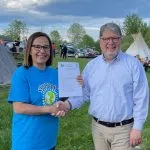
Transforming learning in Saskatchewan’s North
Significant changes are taking place at Northlands College as part of their “Year of Transformation”, and leaders from the college believe these changes are just the beginning.
“Over the last five months, the college looks very different,” said Northlands College CEO Karsten Henriksen.
“This is about self-determination in the north, for the north, by the north.”
At the beginning of 2023, Northlands College launched their “Year of Transformation”, a new organizational structure grounded in learning and access. The initiative is guided by the college’s recent operation review, which found a 57 per cent decline in enrolment since 2011.
“From our perspective, that number is concerning. Fifty-seven per cent equates to approximately 1,000 full-time learners at our institution,” said Henriksen.
There are numerous reasons for the decline, said Henriksen, among them being the college’s focus on centralizing operations around La Ronge for the past decade.
Now, Northlands College is taking a more proactive approach to Indigenizing their campus and curriculum by engaging with the community directly.
“The overarching goal is responsiveness in our cultures and communities. It’s about meeting our learners on their pathway to learning.”
Northlands College has created a Sector Advisory Council, as well engaging their Elders’ council, knowledge keepers, and communities around Saskatchewan to help better understand what communities want from their college, said Henriksen. From there, Northlands College will form a five-year strategic plan laying out where they are going as an educational institution.
“It’s an exciting time for us in terms of re-engaging communities. For me, it’s been heartwarming and reaffirming,” said Henriksen. “The communities know what their needs are, they understand regional issues. Everyone has been willing to come together and find solutions for real-world problems.”
Thus far, Northlands College announced the creation of several directors to lead the college’s portfolios in the areas of: Heath & Wellness, including Nursing, Dental Therapy, and new programming in addictions, childhood education, and long-term care; who will lead programs in Nursing and Dental Therapy while introducing new programming in addictions, childhood education, and long term care; Trades & Technology, including planning for Environment Management Programming; Flexible Learning, including the development of a new Adult Education Model; and a new University Studies director with the goal of increasing access to business, social, and informational studies.
“We’re putting faith in our leaders and empowering them to make decisions,” said Henriksen.
“Success in this plan would mean we’re meeting the diverse, divergent needs of northern Saskatchewan. That, to me, is the benchmark. Are the learners of the north seeing themselves reflected in the curriculum and programs.”
In efforts to meet those divergent needs, Northlands College has appointed Colleen Charles this May as the new Director of Indigenous Initiatives.
Charles, from Lac La Ronge Indian Band, not only brings a personal connection to the north, but has experience teaching Indigenous studies at the post-secondary level. In her role, Charles will be responsible for the development, implementation, monitoring, and updating of Northlands College’s comprehensive Indigenous strategy.
“It’s important to bring direction to the college. To really understand what Indigenization means, what it looks like, and how we can proceed with it in the future,” said Charles.
Charles also plans to implement her Colonialism on Campus art workshop, which weaves through the five stages of colonialism and helps students understand the history of race and racism in Canada. Learners then paint pictures based on the history they’ve learned while infusing their own history and identity into the work.
“Students love it. It brings up a lot of emotions, often things they’ve never thought about before in regards to their past,” said Charles.
“Throughout my work, I remind students that now that you have this knowledge of Indigenous people and history, it’s up to you to go out and share that knowledge.”

